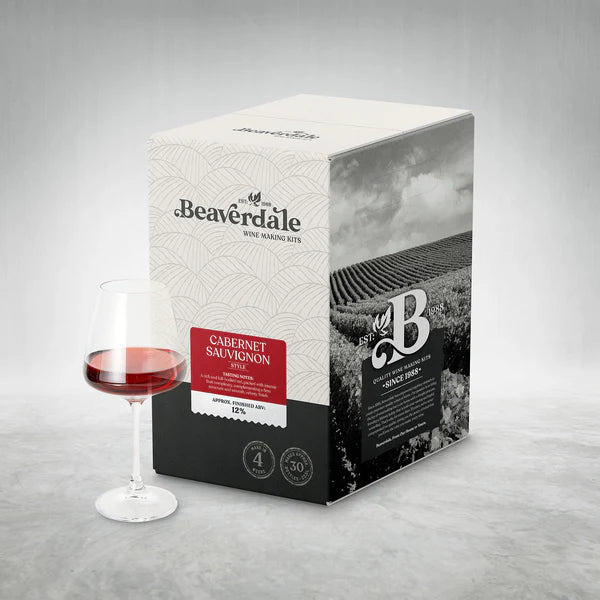Craft a classic, full‑flavoured Cabernet Sauvignon at home with the Beaverdale 30 Bottle Wine Kit. Expect deep colour, ripe blackcurrant and blackberry aromas, hints of plum, cedar and vanilla, and firm, food‑friendly tannins. This dry, oak‑balanced red is straightforward for beginners yet rewarding for experienced makers, and it improves beautifully with bottle ageing.
Key features
- Makes 23L (approx. 30 x 750ml bottles)
- Style: Cabernet Sauvignon – bold, dry, structured, lightly to moderately oaked
- Tasting notes: cassis (blackcurrant), blackberry, plum, cedar, vanilla, spice; firm tannins
- Difficulty: beginner‑friendly; benefits from longer ageing
- Typical timeframe: ready in about 4–6 weeks
- Typical ABV: around 12–13% (process dependent)
- No additional sugar required; formulated from quality grape juice concentrate
- Includes: grape juice concentrate, wine yeast, stabilisers, finings, oak (where applicable), and full instructions
- Best served at 16–18°C; pairs well with steak, roast lamb, grilled meats, hearty stews, mature cheeses
What you’ll need (not included)
- Fermenter (25L), airlock, hydrometer, thermometer
- Syphon, sanitiser, corks, corker, bottles (or alternative closures)
- Optional: degassing tool, filter, extra oak for customisation
How it works (quick steps)
- Sanitise all equipment thoroughly.
- Add concentrate and water to 23L; pitch yeast.
- Ferment until gravity is stable and dry.
- Stabilise and clear with finings; adjust oak to taste.
- Bottle, then condition; flavours round out notably after 3–12 months.
Why choose Beaverdale Beaverdale kits are known for dependable, varietally correct wines with smooth finishes, delivering consistent, cellar‑worthy results at home.
FAQs
- Do I need to add sugar? No—this kit is designed to ferment to strength without extra sugar.
- How many bottles does it make? Up to 30 standard 750ml bottles (23L).
- Is it vegan? Some finings may not be vegan; check the latest kit contents if this is important.
- How long should I age it? Drinkable young, but Cabernet improves markedly after 6–12 months in bottle as tannins soften.


